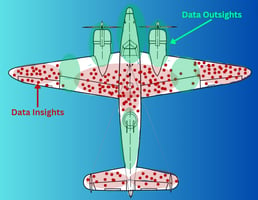Transforming Human Decision Making into the 21st Century

How we manage and what we use to make decisions was based on what resources we had. Two things have radically changed:
- Decision makers need to do far more in complex, disruptive and volatile times to drive performance
- There are better resources available in technology that do not suffer the constraints of reporting.
"Management transforming from report-based decisions to model-based decision processes"
Whilst there is buzz over AI, this is only one component of the total modernization of management decision making into the 21st century. Leaders need to create value, optimise capital and avoid destruction of value (risk). This is beyond human capacity. This requires models to support a higher level of decision making.
We can see this in formula one racing where technology is becoming more critical than the driver for success. Shaving millimetres to reduce resistance to scenario planning when to pit. No matter how talented the driver, without these technologies they are in the backfield. No matter how talented a leader is they will fall behind without modernizing the decision support processes.
"Oracle Study Reveals Decision Making Paradox: More Data, Greater Uncertainty"
Whist we have had decades of promises that data is the answer and that we will all make data driven decisions, the opposite has occurred. A new study "The Decision Dilemma" by Oracle and Seth Stephens-Davidowitz found 85% of leaders suffer decision distress. The study of more than 14,000 employees and business leaders across 17 countries found that 72% admit that the volume of data and lack of trust have paralyzed their decision-making. 74% say that they are making 10x more decisions than 3 years ago. The are trying to consume more data, that is conflicting and where they do not feel it is right. 77% feel the data they get is not relevant to their decisions and is only helpful to data scientists. The reality is that people do not have what they need to make right decisions, faster in more difficult circumstances.
"70% want a robot to make the decision"
As decision makers deal with more inputs, managing more complex systems and having less time to do this they are looking for robots (AI) to help make the decisions. Whilst Chat GPT has sowed considerable excitement, the brutal reality is that AI cannot tell you what it does not have. If you are looking for an AI assistant to tell you what the best way is to price a deal is, AI would require access to details that it does not have and does not exist in a structure that AI can work with.
"The rise of the middle office to support the digital transformation of decision making"
The middle office was a concept of investment banks that is now growing across all organizations to deal with non-operational and non-administrative activities. Activities ranging from risk management, regulatory compliance, to capital optimisation, repricing, asset allocation, strategy, optimization and more are the domain of the middle office. These activities are the basis of critical decision making on the future of the organization. There is a rampant growth in costs and people to manage an expanding portfolio of activities. Despite the critical nature of these activities and the large inefficiencies, the middle office relies on inadequate systems, spreadsheets and manual processes. Not only does this lead to high anxiety and decision distress, it is also an ecosystem that AI has no ability to use.
"EVP - Enterprise Value Planning transforming the middle office"
To resolve the challenges of decision making in this challenging time, we are seeing the growth of new enterprise systems focused on providing relevant and timely information to decision makers in a way that gives them confidence to make bold decisions that get strong results. We are seeing a dramatic change from the report-based systems of the last century to the future of dynamic model-based systems operating in real time.
If decision makers want to have a successful career and be able to deliver strong results in volatile and difficult times, then they need to focus on the middle office. It is no longer the back-room operation. The middle office is now critical for creating value and protecting value

